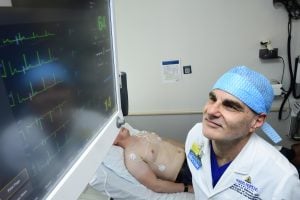
A new artificial intelligence model found previously undetected signals in routine heart tests that strongly predict which patients will suffer potentially deadly complications after surgery. The model significantly outperformed risk scores currently relied upon by doctors.
The federally funded work by Johns Hopkins University researchers, which turns standard and inexpensive test results into a potentially lifesaving tool, could transform decision-making and risk calculation for both patients and surgeons.
“We demonstrate that a basic electrocardiogram contains important prognostic information not identifiable by the naked eye,” said senior author Robert D. Stevens, chief of the Division of Informatics, Integration, and Innovation at Johns Hopkins Medicine. “We can only extract it with machine learning techniques.”
The findings are published today in the British Journal of Anaesthesia.